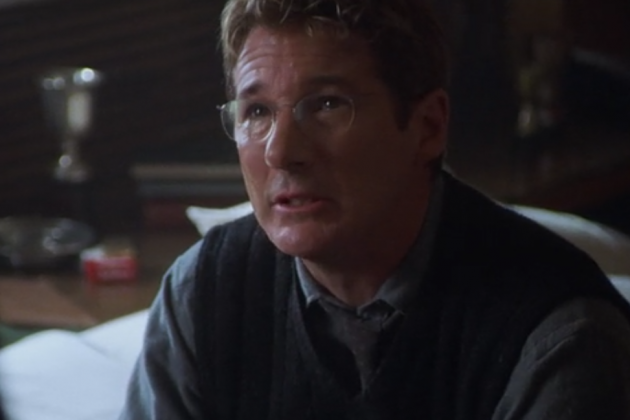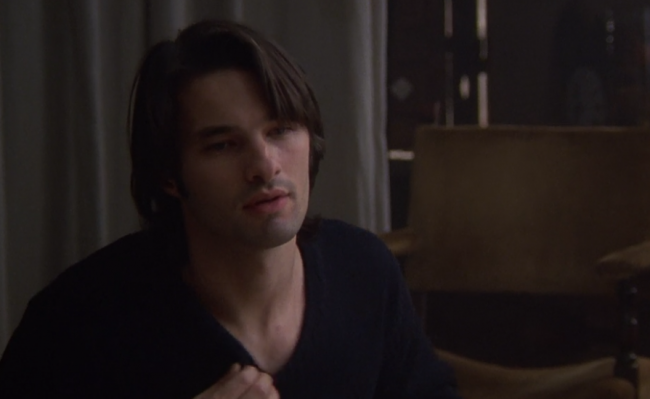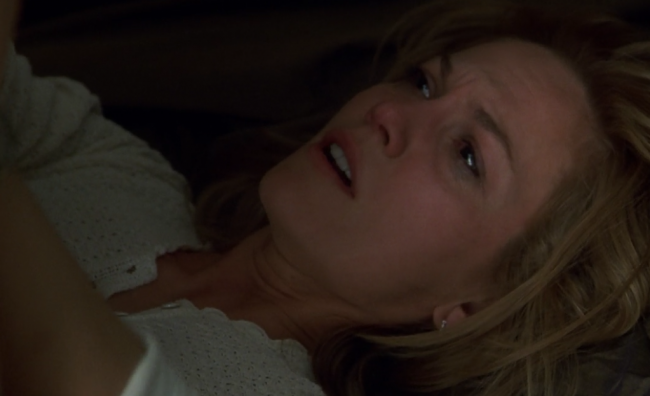Unfaithful is a 2002 romantic thriller about a married woman who strays from her marriage with troubling consequences. It was met with mixed reviews and features some erotic moments but is best remembered for its defining lead role.
Connie (Diane Lane) and Edward (Richard Gere) are a content married couple with a young son named Charlie (Erik Per Sullivan), living in a picturesque suburban home. From appearances, they are happy and while busy with schedules and daily life, seem like a perfect match. So when the wind literally blows Connie into the arms of another man, she is initially confused by her sudden, highly-charged desires, yet when her passions gets the better of her, she succumbs and begins a torrid sexual affair.
Meanwhile, Edward grows to suspect something heavy is on his wife’s mind. He notices little things that seem off and a tiny web of curiosities that don’t add up. For example, he learns an appointment she claims to have is actually a lie, and she seems less receptive to romance initiated by him. Eventually, he hires a private investigator. Naturally, what he discovers is devastating, but it’s how Edward handles it that changes everything.
Directed by Adrian Lyne, Unfaithful sets itself up to be one thing but veers off in another direction and becomes something else. It avoids the trappings of the genre it practices to be by flipping the second half into a story about the realities of two adults in an impossible situation. And this is where the film finds its footing, concentrating on the brittle relationships rather than with edgy cops closing in. Lyne keeps the pace fast and maybe a little too fluid at times, sacrificing bits of authenticity in sake of the story, none more so than the opening wind storm that is best thought of as metaphorical more than genuine. Still, it never unravels, even if it feels like it should. That’s entirely because of the actors.
To begin with, Gere, who is naturally pushed to the peripheral for most of the early story, delivers a powerfully convincing performance, especially as the film shifts at the mid-way point. His actions are drastic but in the moment, honest. What he does feels true, filled with panic, and we empathize even though we may not agree.

Olivier Martinez plays the lover, a man named Paul Martel, and if there is a weakness to the script it lies here, but by no fault of the actor. A figure cut from a romance novel book jacket, he is a blunt chuck of a model type who is hardly convincing as a rare book dealer, but serves his purpose well as the irresistible lover.

Then there is Lane, an exceptionally-cast actor who absolutely stuns in this courageous role. What’s remarkable is her transformation from the attractive but clearly passive wife who is comfortable now in her domestic role, turn into the erotically-charged lover, reborn with a lust she has perhaps never experienced, despite her love for Edward. And it’s here where the film’s most genuine moment arrives, a moment that is one of the most authentic in cinema.
We watch as Connie sits in a commuter train. She is a bit ruffled, her hair tussled and her eyes distant. She has just left Paul’s apartment where we had cut away from what was the start of their first sexual encounter, with him carrying her into his bedroom. We seem robbed of the physical act, a moment heavily built upon, but not for long. In the next scene, on the train, Connie reflects.

We see the two lovers in flashback, experiencing it as a matter of consequence, and this makes a big difference in how it is perceived. Because of this, what we get are two astonishing acting moments from Lane. In one, she is the acquiescing lover, battling an emotional war as guilt and desire fight for control. In a bed with a man seducing her though, the latter has greater power. The other is the introspective post-lover, a victim of the battle that had no clear winner, both still in conflict but now absent of Paul, facing more pressures from guilt, even while the memories of indescribably satisfaction crash upon her like waves. She cries during both moments.

In the love scene, which is less about the sex and more about the vulnerability, watch as Lane shivers and trembles, her body shaking in anticipation as her mind struggles to process both what she is doing and what is actually happening. Then on the train as she reflects on the affair, her face twists as she morphs between joy and pain, lust and loss. The torment of her betrayal to Edward and the pleasure of her tryst with Paul leave her almost squirming. It’s a remarkable sequence and one that Lane absolutely owns. While there are brief moments of nudity, it is rather Lane’s powerful sense of breaking inhibitions that render it so sexually erotic. Typically, moments like this in film are over-stylized and overdone, with exaggerated softcore pornographic elements to titillate the audience, giving the characters a hyper-sense of passion. Not so here.

This is about giving in, with Connie realizing there is an emptiness in her life that was previously unknown, and then allowing that to overcome her. It’s a renewal that utterly consumes her. So difficult is it for her to let this happen, she actually struggles with Paul as he tries to pull himself upon her, with him finally telling her to simply hit him, an act that allows her to physically deal with the conflict in her mind. It’s a startling moment but one that feels earned and necessary for bringing Connie to this commitment. While we never learn why she so readily accepts the affair, especially as she and Edward appear happy, in Paul’s masterful hands, she becomes obsessed with the almost torturous need to be taken by him. They continue to have sex whenever and wherever they can.
Unfaithful is a sharply-written character study about the consequences of betrayal, but more importantly, a betrayal that seems to have no meaning or reason. When Edward asks,”why?,” we echo the sentiment, and yet it is for this very reason that the story has such power. Stripped of the clichés of loveless marriages or straying husbands, the film becomes about circumstances rather than judgments and frees the characters of the cheating spouse tropes. Most especially Connie, played with great skill by the incomparable Diane Lane.
